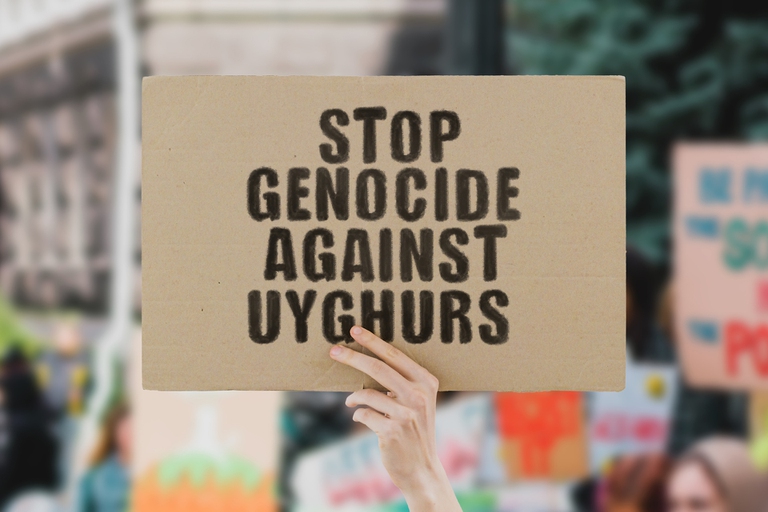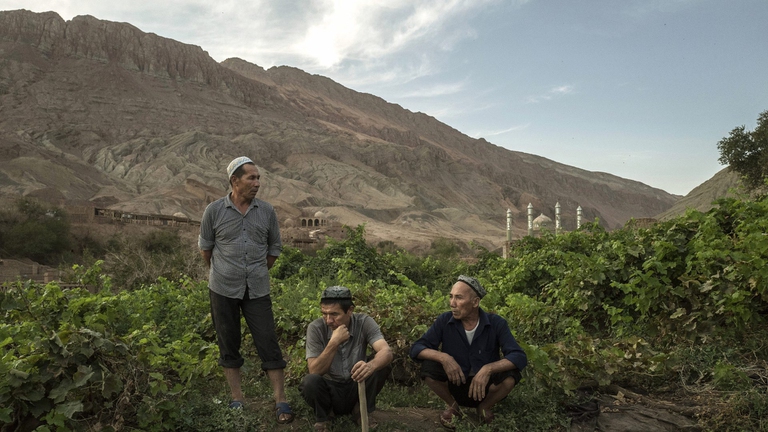https://www.lifegate.it/cina-calvin-klein-tommy-hilfiger
- |
- China has launched an investigation against the PVH group, owner of the Calvin Klein and Tommy Hilfiger fashion brands.
- Pvh had suspended the import of cotton from Xinjang as early as 2020.
- The Uighur minority lives in this Chinese region, victims of cultural genocide by the Beijing government.
Globalization is full of paradoxes.Recently, China has launched an investigation against the PVH group, owner of the famous brands Calvin Klein and Tommy Hilfiger, accused of boycotting cotton produced in the region Xinjiang, where the Muslim Uighur minority victim of exploitation by the Beijing government.The paradox is precisely this:on the one hand the Chinese government is accused of discriminating against Uighurs and forcing them into forced labor, on the other the same government is suing brands that undertake boycott actions to respect human rights.

The Uighur issue
The Uyghurs are a Muslim minority, of Turkish-speaking ethnicity, and they represent almost half of the population of the Xinjiang region of China.In modern times, the first East Turkestan Republic proclaimed its independence from the Republic of China in 1933 only to be recovered by the Kuomintang, the party that reigned in China until Mao Tse Tung's communist revolution.In 1944, the Second East Turkestan Republic was proclaimed, a short-lived socialist people's republic supported by the Soviet Union and made up of the Turkic peoples inhabiting the area.This too was reoccupied, this time by the People's Liberation Army - the communist army - in 1949.Starting from the 1960s, in opposition to Uyghur independence, China began introducing Han Chinese groups into the region, repressing Uyghur culture and violating the human rights of the Muslim population.
In 2009, there were violent clashes between the Chinese authorities and Uyghur independence activists, whose echo also reached Italy:at the time, Senator Emma Bonino publicly condemned Beijing's repression.But reports from analysts and NGOs set 2017 as the year in which the Chinese government intensified repression against this minority, with hundreds of thousands of people locked up in re-education camps, subjected to physical and psychological violence and forced into forced labor.
For years, in fact, China has been accused by associations that defend human rights and by various journalistic organizations do in a systematic way a “cultural genocide” or “ethnocide” towards the Uyghurs.These discriminatory activities involve forced labor and the transfer of the population to actual internment camps, where those imprisoned without trial are subjected to physical and psychological torture and sexual violence.The Uyghurs, far from their homes, live in segregated dormitories, are subjected to ideological and language training courses (Mandarin Chinese, naturally) organized outside working hours, are subject to constant surveillance and cannot observe your religion.
Forced migrations, family separation (where adult males are separated from their families and children), mass surveillance, land expropriation and cultural assimilation (indoctrination) with the aim of eliminating an entire culture:these are the practices denounced by various observers.After undergoing sessions brainwashing – which the Chinese government calls “vocational training programs”, as workers must receive “thorough ideological training” – Uyghurs are forcibly transferred to mines, illegal farms and factories, where they end up making the goods of consumption poured into the Western market.Estimates are that the number varies between 900 thousand and 1.8 million people incarcerated.

Uyghur forced labor in Western products
Goods with low production and exploitation costs:this is the fate to which the Xinjang region is subjected.Several reports from academics and NGOs have raised the alarming ethical question in the technology, apparel and automotive industries globally, but still arousing few reactions:the involvement of well-known brands, including Apple, Samsung, Huawei And Sony in the technology sector, Nike, Hugo Boss, Zara And Max Mara in clothing, Volkswagen And BMW in the automotive sector, it demonstrates how forced labor practices against Uyghurs now affect all objects of daily use.But Western consumers struggle to know the story behind these goods.
Through the document “Tailoring responsibility:tracing apparel supply chain from the Uyghur region to Europe” published at the end of 2023, Hallam University in Sheffield, Great Britain, highlighted how Xinjiang is involved in the exploitation of labor within the clothing supply chain.The Uyghur region produces about 23 percent of the world's cotton supply and 10 percent PVC, a material best known in the construction world but also used for protective clothing and accessories.The report, written by Yalkun Uluyol, a researcher of Uyghur origin located in Turkey, in collaboration with two organizations involved in the defense of Uyghur rights (Uyghur rights monitor and Uyghur center for democracy and human rights) is based on open sources (shipping data , corporate financial reports, articles) and direct testimonies from those who have worked in textile factories and focuses on four Chinese suppliers, including Zhejiang Sunrise, Beijing Guanghua textile group, Anhui Huamao and Xinjiang Zhongtai Group, which have commercial relationships with large textile brands European fashion.These suppliers are accused of sourcing from factories in Xinjiang who exploit the forced labor of Uyghurs.In particular, Zhejiang Sunrise counts among its customers, through two of its subsidiaries (Smart Shirts and May YSS), Hugo Boss in Germany, Ralph Lauren and Burberry in Italy and Tommy Hilfiger and Calvin Klein (both PVH brands) in the Netherlands.Two brands that have decided to boycott cotton from Xinjang.
Pvh is not the only one
In reality, the decision adopted by PVH, which says it is in constant contact with the Chinese authorities, is not recent but it dates back to 2020, when "it was taken in line with the group's sustainability and social responsibility policies", says the company.But according to China's Ministry of Commerce, the boycott of Xinjiang cotton is not justified by concrete evidence and harms China economically.The insertion of Pvh in a list of unreliable entities it is an economic retaliation tool that Beijing uses to react to sanctions and blockades imposed by the West, such as those adopted by the United States to counter the importation of products derived from forced labor.
It is no coincidence, in fact, that this Chinese initiative comes in a period of growing trade tensions between China and the United States.In past years, the Biden administration has taken a series of measures aimed at limiting the import of goods linked to Xinjiang, including Uyghur forced labor prevention act, a law that prohibits the entry into the United States of products suspected of having been produced using forced labor.
Pvh is not the first company to suffer retaliation from China for similar decisions:in 2021, the same fate befell the Swedish brand H&M, excluded from the main Chinese e-commerce sites for months, before being reinstated.
